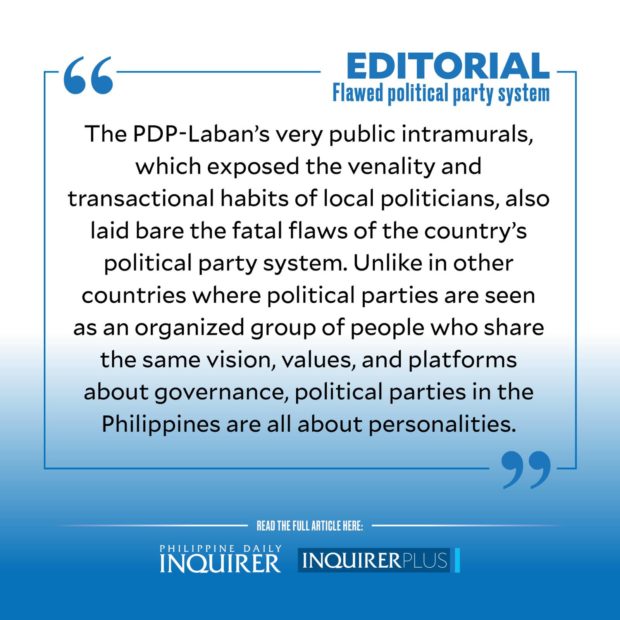Flawed political party system
It may sound like a cosmic joke, but people who have followed the history of Partido Demokratiko Pilipino-Lakas ng Bayan (PDP-Laban) describe as “supreme irony” its recent endorsement of presidential contender Ferdinand “Bongbong” Marcos Jr. How could a party formed in 1982 to unseat Marcos Sr. now support the campaign to bring back another Marcos to power?
In a scathing statement, Mrs. Lourdes Pimentel, widow of party founder Sen. Aquilino Pimentel Jr., described as “thieves” those who “have stolen PDP-Laban, which was created by the blood and sacrifice of people like (opposition senators) Nene Pimentel, Ninoy Aquino, and Lorenzo Tañada, and shamelessly used it to support the candidacy of a person who does not deserve to be president of our country.”
Marcos’ endorsement by the PDP-Laban faction led by Energy Secretary Alfonso Cusi and backed by President Duterte has caused outrage among members of a rival faction led by Pimentel’s son, Sen. Aquilino “Koko” Pimentel III. The Koko wing is supporting presidential aspirant Manny Pacquiao under the banner of the Promdi party while waiting for the Commission on Elections (Comelec) to settle the dispute over the party’s leadership.
The Koko faction emerged from the ouster of both Pimentel and Pacquiao from the party during what the two have called “an illegal assembly” engineered last year by Cusi and Mr. Duterte. In what could be karmic justice, the Cusi wing, which earlier expressed support for Davao mayor and presidential daughter Sara Duterte, found itself with no standard-bearer when she chose to run for vice president instead. With the Comelec thumbing down its proposal to reopen the filing of candidacy, the Cusi faction found itself endorsing her running mate, Marcos Jr., last week.
The PDP-Laban’s very public intramurals, which exposed the venality and transactional habits of local politicians, also laid bare the fatal flaws of the country’s political party system. Unlike in other countries where political parties are seen as an organized group of people who share the same vision, values, and platforms about governance, political parties in the Philippines are all about personalities. Although ostensibly a multiparty system that offers voters more choices in the polls, the country’s democracy is shaped by two major parties that might well be a singular one, as they do not present divergent ideologies and agenda.
In a 2017 press release on his participation in the World Dialogue of Political Parties organized by the Communist Party of China, Pimentel acknowledged as much: “Politics in other countries are based on ideology and policy, as put forward by political parties. In our country, our politics is still personality-based. There is no consistency in policy and institutions are weakened, leading to many of the problems that we now face.”
In the same press release, Pimentel mentioned that PDP-Laban stands for “Theism, Humanism, Enlightened Nationalism, Democratic Socialism, Participatory and Consultative Democracy, and Federalism.” But except for a doomed attempt to push federalism, members of this ruling party hardly mention these ideas, much less how they’d figure in their style of governance.
Indeed, most Filipino voters go for personalities and seldom check the agenda or politics of the parties their candidate/s belong to. Which explains why radio/TV and movie personalities, sports celebrities, and members of political dynasties dominate both local and national politics, with name recall and popularity being their strongest suit.
So why bother with political parties at all? Because aside from a powerful machinery drawn from its network of ward leaders and local officials, a political party is allowed to have election inspectors at each polling place on election day to protect against fraud. Politicians too align themselves with the ruling party to help it get a majority in Congress, for which they are assured committee chairmanships and a bigger share of the pork barrel. This was painfully apparent when Mr. Duterte won in 2016, with the former ruling Liberal Party decimated almost overnight as thousands of local and national officials moved to PDP-Laban. According to Pimentel, the party’s presence in the House of Representatives eventually grew from three to 123 members. By April 2018, 300,000 politicians had joined the party.
Given these ills, the country’s political party system can certainly use an overhaul, starting with a raft of reforms proposed in the Political Party Development Act of 2011. Among other provisions, the bill seeks to strengthen the party system by upholding party loyalty and adherence to ideological principles, platforms, and programs by penalizing turncoatism; reducing graft and corruption by regulating campaign finances through transparent mechanisms, and professionalizing political parties through state subsidies that, in a nonelection year, may be used for party recruitment, civic education, research and policy development, and constituent outreach programs.
Hopefully, such reforms would prevent another spectacle of a political party imploding in public, and eroding people’s trust in truly participative democratic processes.





















